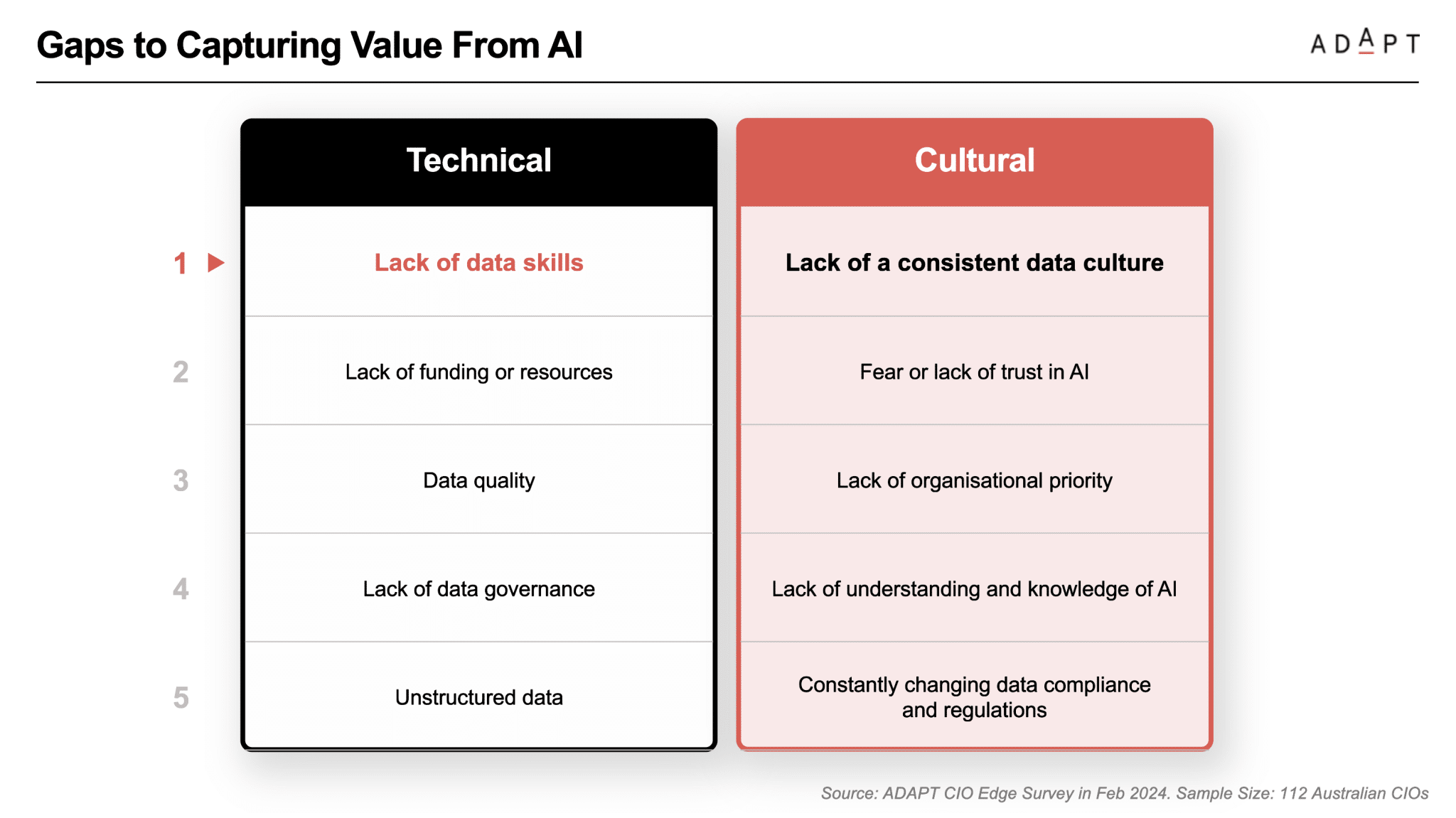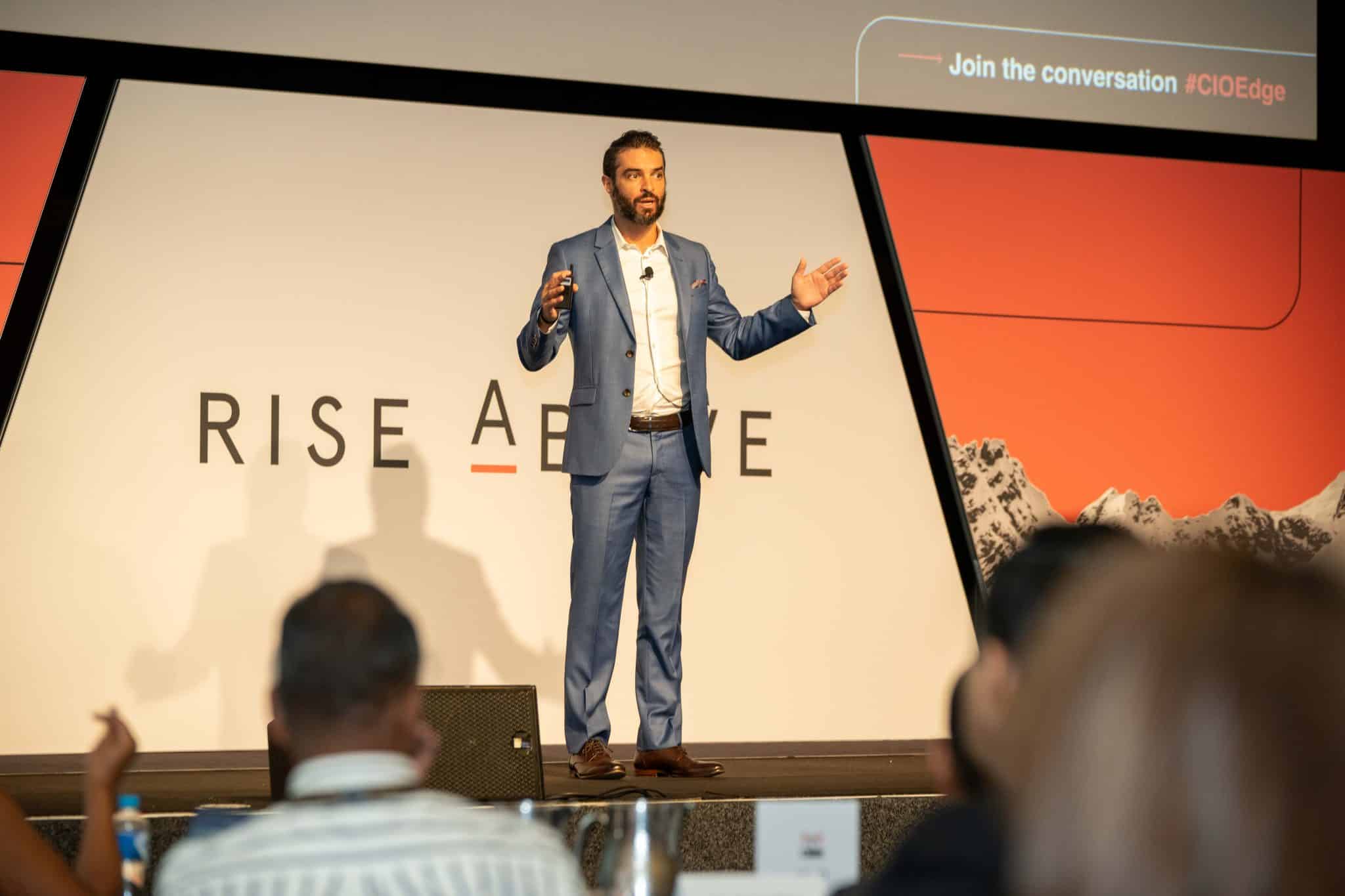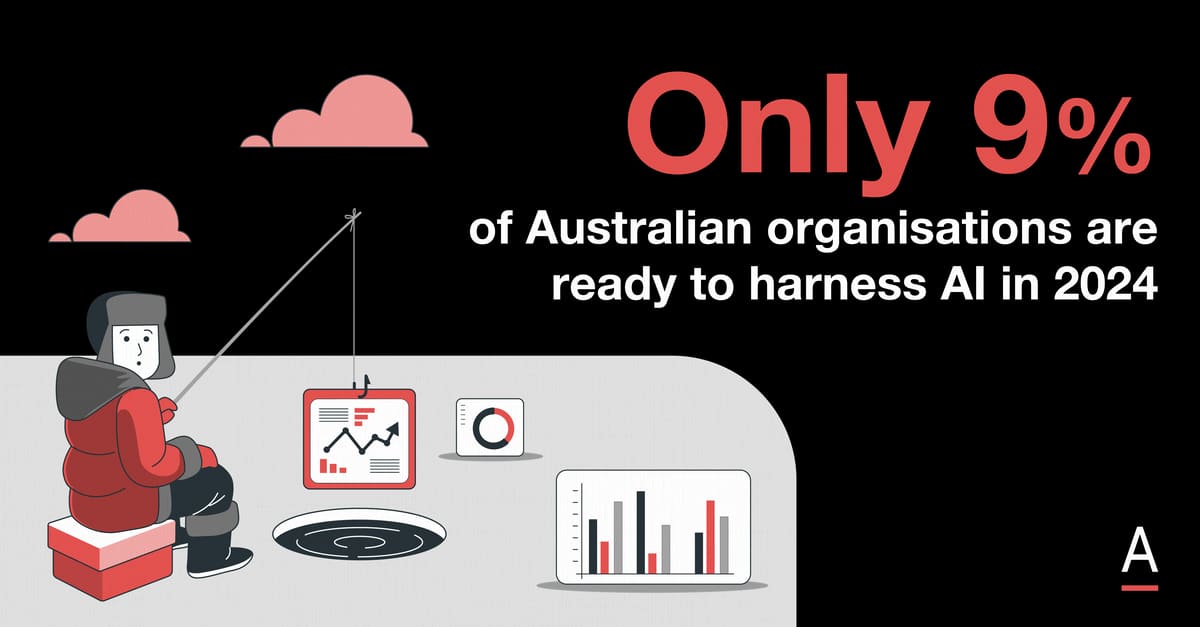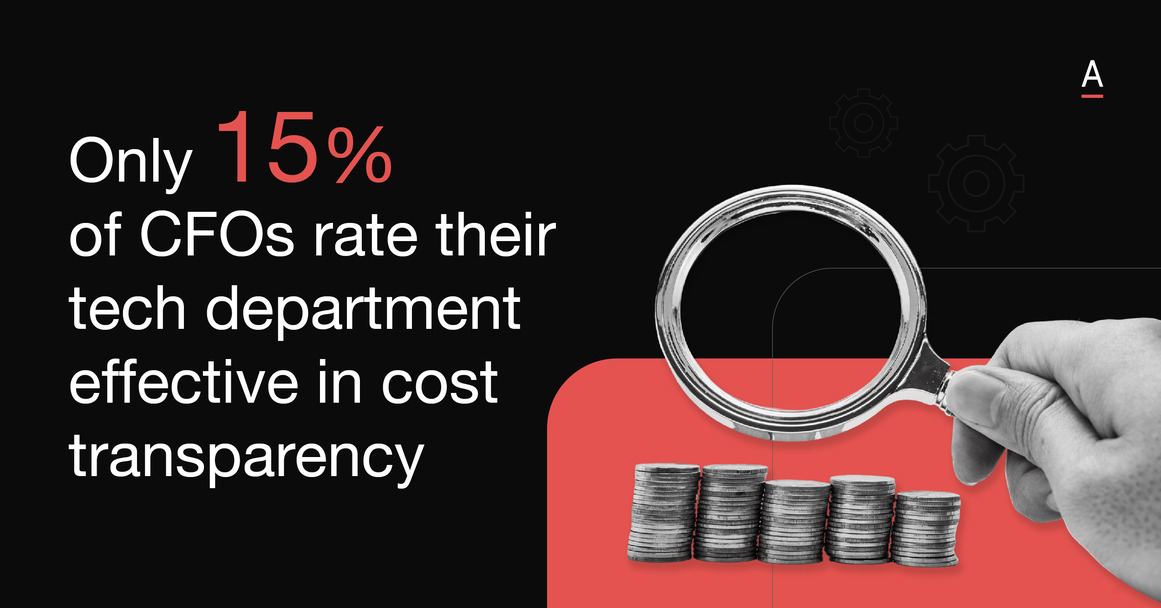How to uplift Aussie organisations’ readiness for AI adoption
Discover key strategies for tech vendors to help organisations achieve AI readiness by focusing on modernisation, cost optimisation, data governance, and more.
Embracing AI has become necessary for organisations looking to innovate and maintain a competitive edge.
As a tech vendor, you can be at the forefront of Australian businesses’ AI journey, guiding CIOs and tech leaders in preparing their infrastructure for AI.
Leverage insights from ADAPT to offer strategic solutions that modernise infrastructure, optimise costs, and enhance data strategies.
Modernising and simplifying as the foundation of AI readiness
CIOs are focused on eliminating legacy technology and reducing complexity in their IT infrastructure.
According to Gabby Fredkin, ADAPT’s Head of Analytics & Insights, legacy technology, stack complexity, and too many manual processes are identified as major barriers to organisations’ safety.

Modern infrastructure is better equipped to handle the increased data loads and processing requirements associated with AI applications, leading to more efficient and scalable AI deployments.
Key Strategies
- Encourage your clients to utilise robotic process automation (RPA) to handle repetitive tasks like invoice processing, freeing up staff for more strategic work.
- Suggest deploying AI-driven threat detection to continuously monitor network traffic and identify anomalies in real-time, preventing breaches and ensuring compliance with industry standards.
Actionable Steps
- Propose conducting a technology audit to identify areas for modernisation and pinpoint outdated hardware or software.
- Work with your clients to develop tailored plans for integrating automation and security enhancements, ensuring compatibility with existing infrastructure.
- Recommend starting with a small-scale pilot, gathering feedback, and refining solutions before a full-scale rollout.
By guiding organisations through modernisation, you help them lay the groundwork for AI readiness, allowing them to seamlessly transition to optimising operational efficiency.
Optimising costs and improving operational efficiency
Organisations are under pressure to achieve more with fewer resources.
Leveraging AI to optimise resource allocation can lead to cost savings by reducing waste and improving operational efficiency.
Demonstrate how your solutions can help organisations yield ROI from automation.
Key Strategies
- Highlight success stories where your technology led to substantial cost savings and efficiency improvements, using metrics like reductions in downtime.
- Provide tools that allow clients to estimate the financial benefits of your solutions, showcasing straightforward returns on investment.
Actionable Steps
- Encourage analysing existing operations to identify inefficiencies and areas for cost reduction.
- Tailor your offerings to address specific operational challenges, maximising efficiency.
- Support continuous monitoring and adjustment of solutions to ensure optimal performance.
Helping clients optimise costs enhances operational efficiency and frees up resources for strategic AI investments.
Governing data as the bedrock of AI adoption
Implementing strong data governance policies ensures that AI systems are fed with high-quality, accurate data, which is essential for reliable AI outputs.
According to ADAPT’s CIO Edge survey, organisations with good data governance are four times more likely to be in the prepared category for AI readiness.

Proper data management practices can enhance compliance with regulatory requirements, reducing the risk of data breaches and associated penalties.
Position yourself as a partner in enhancing data quality and transparency.
Key Strategies
- Advocate for solutions that guarantee data accuracy and reliability, maintaining high data integrity standards.
- Offer workshops on best practices in data governance, equipping organisations with the necessary knowledge and skills.
Actionable Steps
- Help assess current data management practices to identify gaps and areas for improvement.
- Collaborate on developing and implementing frameworks tailored to organisations’ needs.
- Facilitate ongoing training to ensure adherence to data governance policies.
Focusing on data governance enables organisations to support AI implementation with reliable and accessible data.
Cultivating a data-literate culture
Promoting data literacy elevates AI readiness.
In fact, organisations with strong data literacy are nine times more likely to be prepared for AI.

A data-literate workforce can make more informed decisions, driving better outcomes and enhancing competitive advantage.
Key Strategy
- Offer training programs that enhance AI understanding and foster long-term client relationships.
Actionable Steps
- Help assess organisations’ data literacy to identify gaps.
- Address identified gaps and promote a culture of data literacy.
- Provide resources and opportunities for ongoing education.
By assisting organisations in cultivating a data-literate culture, you empower their employees to utilise AI tools effectively, driving innovation and growth.
Addressing technical and cultural barriers
Common barriers to AI adoption include a lack of data skills and a fear of AI, as highlighted by Gabby Fredkin during the ADAPT event.
Addressing technical barriers through scalable and user-friendly AI solutions can accelerate AI adoption across different departments.
Key Strategies
- Offer scalable platforms that make AI adoption accessible and reduce complexity.
- Promote frameworks focusing on transparency and ethical practices, building client trust.
Actionable Steps
- Conduct assessments to pinpoint technical and cultural barriers to AI adoption.
- Create frameworks and platforms to address these barriers, making AI technologies more accessible.
- Encourage a culture that embraces AI adoption through clear communication and leadership.
- By helping organisations address these barriers, you enable them to harness the full potential of AI.
Learning from Carsales – A model for AI adoption
Carsales in Melbourne is a shining example of successful AI adoption.
They started with manageable projects, prioritised customer trust, and gradually scaled successful solutions.
This approach minimised risk and built confidence in AI technologies.
Encourage your clients to follow a similar strategy, helping them realise AI benefits while mitigating risks.
Achieving AI readiness requires a holistic approach that covers technology, processes, and culture.
Organisations can unlock AI’s full potential by focusing on modernisation, cost optimisation, data governance, architectural maturity, and cultural barriers.
As a tech vendor, you are instrumental in this journey, offering solutions and strategies that empower organisations to innovate and thrive in an AI-driven future.
























